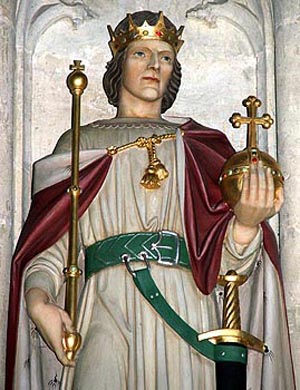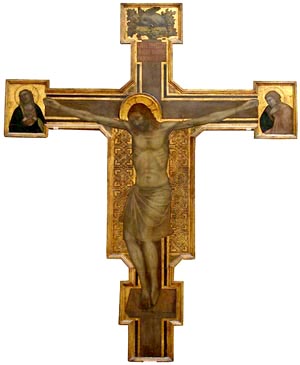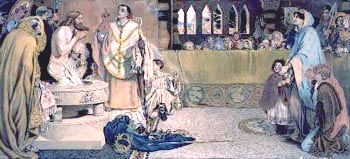 |
The Saint of the Day
St. Edwin – October 12
Prof. Plinio Corrêa de Oliveira
Biographical selection:
Edwin, born in 584, was a prince of the Royal family of Deira in England. His father, King Aelle, was deposed, and Edwin was forced to flee and was raised in exile.
Once, Edwin, a pagan, met a stranger who predicted the restoration of his kingdom if he would promise to do whatever would be taught him regarding his own salvation. Edwin promised and the stranger, laying his hand upon his head, bade him remember that sign. Shortly after that incident, due to diverse political and military circumstances Edwin recovered the Kingdom of Deira, and afterward became King of all Northumbria, one of the seven parts into which England was divided at that time.

St. Edwin, King of Northumbria (584-633)
|
When his first wife died, he married the Catholic Princess Ethelburga, daughter of the King of Kent. He agreed that she should be allowed to practice her religion and promised to study the truths of the Catholic Faith. He also welcomed to his court St. Paulinus, Archbishop of York and chaplain of the Queen, who began to exercise influence over him. An attempt on Edwin’s life was made, but he was saved by a minister who took the dagger blow directed against him. The same night his wife gave birth to a daughter, Enflaed. That child became the first Catholic baptized in his kingdom.
Touched by these two things, Edwin promised to convert if he would win the war against the King of the West Saxons. He conquered this King on the battlefield, and stopped worshipping idols and began to take instruction from St. Paulinus. To encourage him, Pope Boniface V sent a letter and gifts, but Edwin remained pagan. St. Paulinus continued to teach him, but the King did not convert.
One day, the Archbishop approached the King, laid his hand on his head, and asked him if he remembered that sign. Edwin recalled the stranger from time past; quite moved he repented of his former life, converted, and was baptized on Easter 627. He became an exemplary Catholic and an apostle of his people. He also helped the Catholic Faith to be spread in other Kingdoms of the English Heptarchy.
Penda, a powerful pagan King of Mercia, in alliance with the Welsh Prince Cadwallon invaded Northumbria. At the battle of Hatfield Chase, on October 12, 633, they defeated and killed St. Edwin.
Comments of Prof. Plinio:
There would be many things worthy of comment in the life of St. Edwin, King and warrior, but I will draw only one important point to your attention.
Normally, when we study this period of Europe’s foundation, we see that there were glorious men, like Clovis, who by the merit of their Baptism won many battles, defeated all their enemies, and brought their peoples to the Faith. They did not oblige their peoples to believe, but their example and arguments convinced them to convert and embrace the Catholic Faith. Those glorious men ended their lives in an aura of splendor that represented the dawn of the Middle Ages.

The life of Christ ended in apparent defeat
Crucifiction by Giotto di Bondone
|
But in the life of St. Edwin, even though he won many battles and converted numerous people, he ended his life defeated, his kingdom invaded.
After the long and difficult work of St. Paulinus to convert him, St. Edwin embraced the Faith with sincerity; he also helped to convert many others and died in defense of the Faith.
The fact that his life ended with defeat gives me the opportunity to remind you that we also must pass through defeats in our fight against the Revolution.
Many of us have a triumphalist mentality whereby we imagine that we should never suffer a defeat. We think that we should make continuous strong blows against the Revolution, going from battle to battle in victory. This march against our enemies is seen as a kind of military parade, conquering all the enemies with grandeur and arriving on the next chapter of History – the Reign of Mary – without a single scar on our bodies.
This mentality is very wrong, and the life of St. Edwin is a model for us to understand how life is not like this. Not only he, but Our Lord Jesus Christ was defeated from a human point of view. Our Lord was rejected, persecuted, thrown into prison, violently beaten, crucified, and killed. Almost all of his friends and disciples abandoned Him; at the foot of the Cross He had only one apostle and a few women who continued to be loyal to him. This was all that remained of His lifelong apostolate. That is, humanly speaking, His death represented a complete failure.
We know, however, that from that defeat our Redemption came; we know that sharing the merit of the Passion, the blood of the martyrs is the seed of Christians. Its fecundity produces the repentance of those who abandon the Catholic cause and their true contrition and return, as happened with the Apostles. It also attracts the hardest sinners to the good path. The Catholic blood shed in the defense of the Faith has this virtue. This is a very important and elevated principle that we should never forget, that should be a source of constant encouragement in our spiritual lives.
There is also another simpler and less elevated principle: If we enter a battle in which we cover the enemy with blows, it is absolutely normal that we also should receive many blows. If our fight has some victories, it is normal that it also have some defeats. Such defeats are also a part of war. Whoever thinks differently is outside of reality, is living in a dream world where he will have many unpleasant surprises.

The baptism of St. Edwin
|
I had a German fraulein who was governess of my sister and me when we were children. I remember that during World War I she was indignant when the English pilots bombed Berlin. “O those arrogant English!” She used to exclaim. “How dare they bomb Berlin! They have no right to do that!” I did not share her indignation, because I thought her argument was void. In fact, if the Germans were bombing London and Paris, I could not understand why the English and French pilots should not also bomb Berlin. If you attack the house of your neighbor, your neighbor acquires the right of counter-attack. It is the principle of legitimate self-defense. It is absolutely normal. It is the basic law of war.
So, defeats should be accepted as normal in our fight. They should not be cause for surprise or discouragement. Our fight is a work of dedication to the Catholic cause that, as in any fight, seeks the final victory. But before that victory comes, we must have defeats – and we already have had many. A manly spirit faces the defeats, re-starts again from zero, even from below zero, and continues the fight for Our Lady.
Elias the Prophet, for whom we have a special devotion and who in many senses is our model, will one day come to fight against the Antichrist. It will be the most glorious fight in History. He will challenge that Man of Sin in a public polemic and leave the Antichrist speechless. For this reason, he will be killed and his body along with Enoch’s will be exposed in a public square for three days. Only after this spectacular defeat will Our Lord come and with a whisper from His Divine lips, defeat the Antichrist.
These are principles that should always be in our minds. The life of St. Edwin gave us the opportunity to recall them. Let us ask him to obtain for us the grace of fortitude and perseverance in our fight against the Revolution either in victory or in defeat.


  | | Prof. Plinio Corrêa de Oliveira | |
The Saint of the Day features highlights from the lives of saints based on comments made by the late Prof. Plinio Corrêa de Oliveira. Following the example of St. John Bosco who used to make similar talks for the boys of his College, each evening it was Prof. Plinio’s custom to make a short commentary on the lives of the next day’s saint in a meeting for youth in order to encourage them in the practice of virtue and love for the Catholic Church. TIA thought that its readers could profit from these valuable commentaries.
The texts of both the biographical data and the comments come from personal notes taken by Atila S. Guimarães from 1964 to 1995. Given the fact that the source is a personal notebook, it is possible that at times the biographic notes transcribed here will not rigorously follow the original text read by Prof. Plinio. The commentaries have also been adapted and translated for TIA’s site.
|
Saint of the Day | Home | Books | CDs | Search | Contact Us | Donate

© 2002- Tradition in Action, Inc. All Rights Reserved
|
 |

|